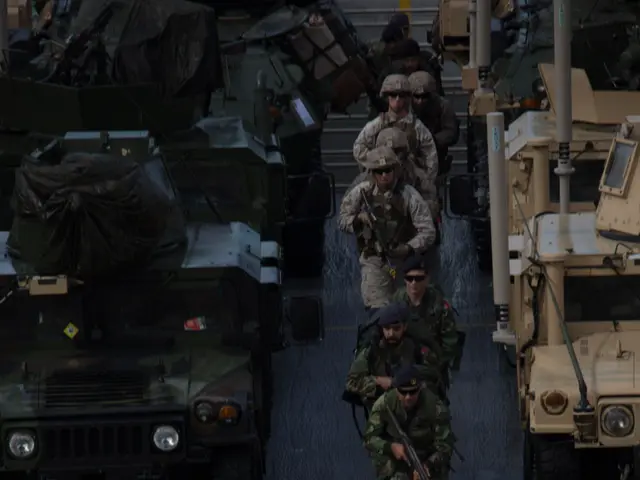Humanitarian group claims: One out of every eleven individuals around the world is experiencing hunger
In a concerning development, one in eleven people worldwide is currently experiencing hunger, according to recent statistics. This alarming figure has increased by 152 million since 2019, highlighting the urgent need for action.
The situation in Gaza, a region under blockade and militarized aid distribution, is particularly dire. More than two million people face extreme food insecurity, a stark increase from the previous 400 points of food access. This has forced civilians to risk gunfire while attempting to reach food, leading to a humanitarian catastrophe with conditions deteriorating at an alarming rate.
The President of the Welthungerhilfe organization, Marlehn Thieme, has warned that cuts to funding for humanitarian aid can lead to hunger, displacement, or death for millions of people. This warning is particularly relevant in Gaza, where funds allocated for aid this year have seen a 53 percent decrease from the previous year.
The Welthungerhilfe, an organization that implements overseas projects in 37 countries, supporting around 18.7 million people, expresses concern over cuts to aid funds in the United States and Germany. In Gaza, the high cost of food is a significant issue, with 25 kilograms of wheat currently costing over 500 US dollars.
To alleviate these issues, the Welthungerhilfe supports local farmers by providing better seeds or transitioning to other agricultural methods. However, the fuel for the organization's water desalination plant, which produces drinking water, is running low and often cannot reach the plant due to bombardments and evacuations.
Welthungerhilfe underscores that hunger and violent conflict are intimately linked, with food insecurity undermining peace efforts and conflict perpetuating hunger. The organization emphasizes the need for diplomatic initiatives to resolve conflicts to improve food security. Across its operations in 37 countries, Welthungerhilfe combines immediate humanitarian relief with long-term development programs to combat hunger exacerbated by armed conflicts, natural disasters, and climate change.
In Gaza, the dismantling of the humanitarian system through the blockade and restricted aid access is central to the acute food insecurity problem. Experienced humanitarian actors from Welthungerhilfe and other NGOs remain ready to deliver aid at scale, but political obstacles and militarized restrictions severely hinder effective response.
Welthungerhilfe reports progress in fighting hunger globally but warns that the current pace is insufficient to achieve the Zero Hunger goal by 2030. The organization urges increased political engagement and humanitarian funding to address crises like those in Gaza, Syria, and Sudan.
Mogge, a representative from Welthungerhilfe, has expressed shock at the humanitarian situation in Gaza, which he deems one of the worst he has seen in his over 30-year career. In many areas, the Gaza Humanitarian Foundation is responsible for supply, with reports of deadly incidents near their distribution centers.
The organization's efforts in Gaza are crucial in addressing the current food security crisis. However, political obstacles and militarized restrictions continue to hinder effective response, making it imperative for diplomatic initiatives to resolve conflicts and improve food security.
- The urgent need for action to combat global hunger is emphasized as one in eleven people worldwide currently experiences hunger, with a significant increase since 2019.
- The President of the Welthungerhilfe organization, Marlehn Thieme, has warned that cuts to funding for humanitarian aid can lead to hunger, displacement, or death for millions of people.
- In Gaza, a region under blockade and militarized aid distribution, more than two million people face extreme food insecurity, leading to dangerous situations where civilians risk gunfire to reach food.
- Funds allocated for aid in Gaza this year have seen a 53 percent decrease from the previous year, further worsening the situation.
- The high cost of food in Gaza is a significant issue, with 25 kilograms of wheat currently costing over 500 US dollars.
- To alleviate issues, the Welthungerhilfe supports local farmers by providing better seeds or transitioning to other agricultural methods.
- However, the fuel for the organization's water desalination plant, which produces drinking water, is running low and often cannot reach the plant due to bombardments and evacuations.
- Political obstacles and militarized restrictions severely hinder effective response to the food insecurity crisis in Gaza.
- Welthungerhilfe combines immediate humanitarian relief with long-term development programs to combat hunger exacerbated by armed conflicts, natural disasters, and climate change.
- The dismantling of the humanitarian system through the blockade and restricted aid access is central to the acute food insecurity problem in Gaza.
- Welthungerhilfe urges increased political engagement and humanitarian funding to address crises like those in Gaza, Syria, and Sudan, to achieve the Zero Hunger goal by 2030.
- In the face of such dire conditions, the efforts of Welthungerhilfe and other NGOs in Gaza are crucial in addressing the current food security crisis, making diplomatic initiatives to resolve conflicts and improve food security all the more imperative.





